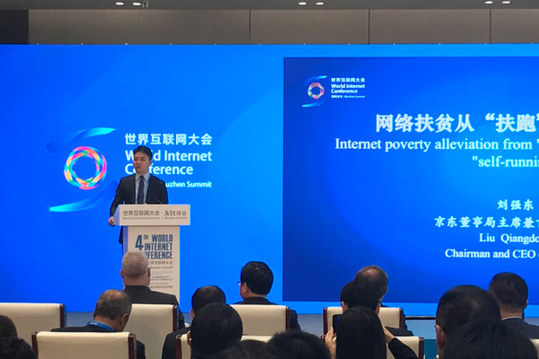Internet essential to ending poverty worldwide
|
 |
|
Liu Qiangdong, president of JD.com, addresses the Internet-driven Poverty-alleviation Forum at the 4th World Internet Conference underway in Wuzhen, Zhejiang province on Dec 3. [Photo by Xiang Wenjian/chinadaily.com.cn] |
After a period of world-historic poverty reduction, China faces a difficult "last mile" of progress on the road to ensure the end of poverty in the country by 2020. To turn this goal into reality, governments, social organizations and enterprises must make use of the internet to lift the last cohort of impoverished people into a better life — and at the “Sharing of Dividends” forum, part of the 4th World Internet Conference in Wuzhen, new methods were discussed to do just that.
Representatives from all walks of life attended the forum to share poverty alleviation solutions they'd found through their experiences, both in China and in countries across the globe.
To ensure the worldwide poverty alleviation mission can be completed, speakers emphasized the need to improve internet access for people in rural areas. Providing a connection to the rest of the world via the internet allows impoverished citizens to join the digital economy and bring their products to niche consumers in cyberspace. Liu Qiangdong, chairman and CEO of JD.com, discussed both the building of logistics infrastructure to make e-commerce shipping easier and the development of markets for premium, local products.
Xiuyun village Party secretary Li Jun, a recipient of China’s national poverty alleviation award, continued in this vein. He mentioned efforts in Sichuan province to maintain traditional methods of agriculture while connecting farmers to customers through “poverty alleviation stores”, where buyers can scan a QR code to learn exactly where crops or livestock came from. With a trackable path from farm to table, urban populations hungry for higher-quality produce and meat will be happy to pay a higher price — and because purchases happen in bulk over set periods of time, farmers will no longer have to worry about price fluctuations damaging their livelihoods. This helps guarantee stability for a previously precarious group of people, and increase their incomes.
Through the internet, essential services can also reach remote regions of the country, providing residents with a higher quality of life. With improved networks and higher rates of connection, health care and education can be digitized, allowing trained medical staff and educators to do their work anywhere without the need of travel. Online classes, streamed live, help train the younger generations and apps like WeDoctor can make diagnosis and treatment of disease far more cost-effective. With 40 percent of poverty caused by illness, this new form of medical outreach is a big step forward for poverty eradication.
As Bao Jian’an, executive vice president of the Agricultural Development Bank of China, said, the closer to information, the market and education a person is, the farther they are from poverty. With new advances in internet technology, China and the world have a unique opportunity to bring the global population closer to all three than ever before.
The author is a copy editor with chinadaily.com.cn.
The opinions expressed here are those of the writer and do not represent the views of China Daily and China Daily website.


















